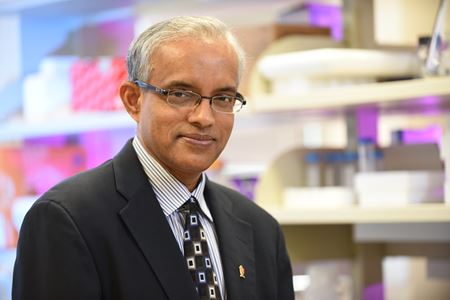INDIANAPOLIS—While trying to understand what initiates breast cells to become cancerous, researchers at the Vera Bradley Foundation Center for Breast Cancer Research at Indiana University Melvin and Bren Simon Comprehensive Cancer Center have identified a new target for breast cancer treatment.
“When comparing healthy breast tissue and cancerous cells, we wanted to find out what is the earliest genomic change that happens to initiate the cancer,” said Harikrishna Nakshatri, PhD, the Marian J. Morrison professor of breast cancer research at IU School of Medicine and a researcher with the Vera Bradley Foundation Center for Breast Cancer Research at the IU Simon Comprehensive Cancer Center. “In that process, we identified a gene called TONSL that can make breast cells proliferate indefinitely.”
Nakshatri and his research team found the TONSL gene is amplified in about 20 percent of breast cancers, and more than 30 percent of metastatic breast cancers. They used healthy breast cells from the Komen Tissue Bank at the IU Simon Comprehensive Cancer Center to understand the earliest changes in healthy cells as they become cancerous.
Their findings, “TONSL Is an Immortalizing Oncogene and a Therapeutic Target in Breast Cancer,” was published this week in the journal Cancer Research.
“Most of the cancer research to date is focused on understanding what happens when cancer progresses, but the earliest event that leads to cancer initiation has been the hardest to figure out,” Nakshatri said. “The very initial step in cancer is that these cells gain the ability to proliferate, and that's the very first step that we have been able to make in models using tissue from the Komen tissue bank.”
Nakshatri said the TONSL protein works with other proteins, including one called FACT. In the breast cancer models his team created with the TONSL amplification, the breast cancer was highly susceptible to an existing drug that targets that FACT complex. Now researchers hope these findings can be translated for future breast cancer treatments.
“Breast cancer is a diverse disease with different subtypes, and some patients respond to the different treatments, and others do not. With 20 percent of breast cancer patients having amplification of this gene, more research is very important to target TONSL,” said Aditi Khatpe, first author of the paper and an IU School of Medicine doctorate student.
Khatpe, a cancer center trainee in Nakshatri’s lab, received the AACR-Sanofi Scholar-in-Training Award for the research abstract highlighting these findings. She presented the research poster at the American Association for Cancer Research (AACR) 2023 Annual Meeting this week.
Additional authors on the paper include cancer center members Jun Wan, PhD, Yunlong Liu, PhD, Kenneth Nephew, PhD, and Kathy D. Miller, MD. This research was funded in part with support from the Catherine Peachey Fund and the Vera Bradley Foundation for Breast Cancer.
About the IU Simon Cancer Center
The Indiana University Melvin and Bren Simon Comprehensive Cancer Center is the state’s only National Cancer Institute-designated Comprehensive Cancer Center and one of only 53 in the nation. The prestigious comprehensive designation recognizes the center’s excellence in basic, clinical, and population research, outstanding educational activities, and effective community outreach program across the state. It is also one of only 33 members of the National Comprehensive Cancer Network. As a member, the center’s physicians have a role in determining the recognized standard of clinical care for cancer patients. The center is the central hub for cancer research and education across Indiana University.




